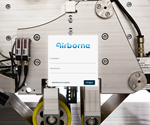Airborne, NCC to develop AFP data warehouse architecture
Using the National Composites Centre’s Automated Fiber Placement (AFP) machine, the project will develop a data warehouse to connect automation with digitalization and enable Industry 4.0.

The National Composites Centre (NCC, Bristol, U.K.) and Airborne (The Hague, Netherlands) are working together to design a system to collect and store data from an Automated Fiber Placement (AFP) machine.
For the collaborative project, the companies are defining use cases by considering source and type of data from sensors. The challenge, Airborne says, is to develop a data warehouse capable of providing insights through analytics to allow future optimization. These first steps will reportedly be the basis for the project’s vision to connect automation with digitalization and enable Industry 4.0 capability. The project has already started and is planned to be complete by November 2019.
The AFP machine at the NCC was acquired as part of the iCap program, which is a £36.7 million ($458 million) investment in 10 digital manufacturing technologies tailor-made to the NCC’s specifications, in order to speed the development of all forms of composite manufacturing.
“The NCC and Airborne share a vision to make composites easier to use and more affordable. We are delighted to be working on this program to allow new insights into AFP processing,” says Joe Summers, managing director at Airborne UK.
“Being able to network equipment and effectively store manufacturing process data is an important step forward for the composites industry to be smart and connected,” says Marc Funnell, head of digital at the NCC. “As a world-leading composite research facility the NCC acts a ‘demonstrator’ for industry. This partnership with Airborne will enable the NCC to build upon its work in applying modeling and data science techniques to derive more comprehensive understanding of composite processes, ultimately demonstrating the potential of digitally enabled manufacturing to produce parts more efficiently whilst maintaining the highest level of quality.”
Related Content
-
Next-gen composites manufacturing: Combining material, machine and mold cavity data with analytics
Using a sensor, an edge device and machine learning software, sensXPERT sees into processes and is improving quality and cutting scrap, cycle time and energy use for composites customers like ZF and Carbon Revolution.
-
New Frontier Technologies launches digital twinning, high-fidelity simulation capability
3D imaging and analysis capability illustrates detailed, quality characterization and performance simulation of composites and other advanced materials that properly captures the as-manufactured component.
-
DLR develops safe, flexible workspaces for robot-assisted manual draping
The EU project Drapebot works on new ways of collaborating with industrial robots for manual CFRP preforming for large aircraft structural parts.

.jpg;width=70;height=70;mode=crop)














